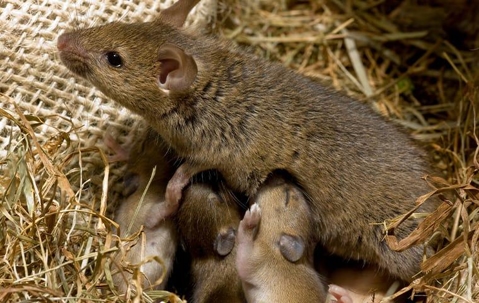No Rock Island home is better with mice in it. Mice are destructive pests that chew holes to get in and don't stop chewing once they get in. They can damage insulation, sheetrock, baseboards, and chew on internal wiring. They chew on stored items and are especially prone to getting into stored furniture. Inside furniture, they tear everything up to make their nests and they soak the interior materials with their urine. As they move about homes, they spread harmful bacteria, ticks and other parasites, and their tiny droppings. All of these can lead to sickness in your home. We could go on and on but hopefully, you get the point. You should never allow Rock Island mice into your Rock Island home. Sadly, this is the time of year when mouse infestations rise, as mice seek warm interiors to get away from the cold temperatures of winter. We've asked the experts here at Quik-Kill Pest Eliminators to give the top 3 things Rock Island Homeowners can do to avoid mice this winter. Here they are.
1. Seal or Protect Entry Points
Mice take advantage of tiny holes and make them bigger. They don't have to make them very big because a typical mouse can fit through a hole the size of a dime. Some of the locations mice target are:
- Weatherstripping.
- Door sweeps.
- Screens.
- Window and door frames.
- Rotted wood in sole plates.
- Vent covers.
- Seals around roof penetrations.
Soffits.
Use a caulking gun, a high quality expanding foam, and wire mesh to seal things up. Trim tree branches away from your roofline and put steel mesh into your downspouts to keep mice from climbing up to your roof. Put metal flashing over spots that keep getting targeted.
2. Remove Hiding Places
Mice are timid creatures. If a yard has no hiding places, a mouse is not likely to run out in the open to get all the way to your foundation perimeter. The more clutter or overgrowth you have in your yard, the more mice you're going to have exploring the exterior of your home. Store items in your shed or remove them from your property if possible. Pick toys up. Move construction materials and wood piles at least 20 feet from your exterior.
3. Traps
If you have fewer mice near your home, you'll have fewer mice getting into your home. Strategically placed, tamper-resistant traps can help to reduce mice populations in troublesome areas and to keep mice from getting into your home. Be sure to properly identify the mice you're dealing with so that you can select traps and baits that will be effective at capturing them.
How a Professional Can Help
While you can employ the above tips to prevent mice from getting into your home, there are some things you should keep in mind. Rodent control is a lot of hard work, and if you fail to do it properly, you may suffer from the impact of having mice in your home without realizing it. You might blame a tick infestation on your pets. You may shrug flu-like symptoms off as the flu or the common cold. You may see spiders, ants, silverfish and other pests and not realize that those pests used a hole created by mice to get into your home. The best solution for mouse control is to reach out to a licensed and experienced pest management professional. It just so happens that we have a whole team of highly-trained and super-helpful people who work here at Quik-Kill Pest Eliminators. We would love the opportunity to help you with your rodent problem. Reach out to us any time for immediate assistance.

